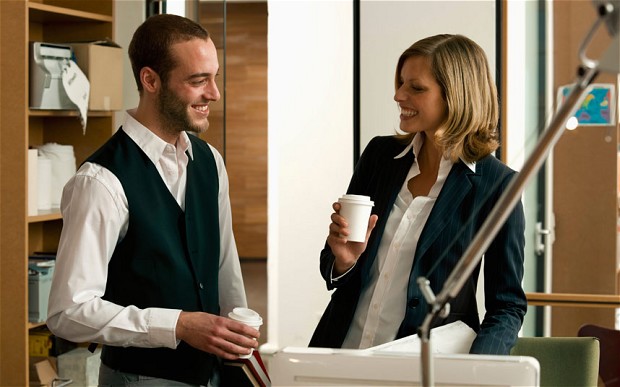This article in the Independent might just be the most dispiriting thing I have read so far this year. It is a long list of tips about “what is and isn’t acceptable in the modern workplace” and how one can avoid finding oneself in the same position as Lord Rennard – that is, accused of sexually harassing one’s colleagues. You might expect the advice to include stuff like “don’t pat anyone’s bum” or “don’t photocopy pictures of your privates and leave them on a colleague’s desk”, which are the kind of workplace codes I could get behind. But it goes much further than that. Apparently the best way to avoid being accused of inappropriate behaviour in the workplace is to turn yourself into an emotional cripple who never says anything nice or complimentary, far less cheeky, to your colleagues.
So, for example, if you’ve been thinking about complimenting a female colleague on her pretty dress or a male colleague on his spiffing new haircut, think again. The Independent advises that when it comes to compliments, “non-safe topics include hair, shoes and cleavages”, and “safe topics” include “work and… that’s it”. That is, you can tell a colleague that he or she is doing a good job, but not that they look cute or well-coiffured. If you are still determined to compliment colleagues on non-work things, apparently there’s a right way and a wrong way to do it: an etiquette expert tells the Indie that compliments must be relayed from a “respectable distance” rather than being whispered in someone’s ear. Perhaps people should carry metre-long rulers at work, which they might whip out whenever they want to say something nice to a colleague from a respectable, non-leering distance.
Older people must be especially careful in the workplace, because apparently their preferred terms of endearment – love, darling, sweetheart – are criminally archaic. The Independent says it is problematic to behave in an “avuncular manner” in the workplace. An expert tells the paper that older workers should not use old-fashioned terms like “love” unless they would be comfortable with being called “grandpa” or “village elder”. But isn’t this just the petty policing of the kind of lingo used largely by working-class people of a certain age? In one of my old workplaces, the older men uniformly referred to every young woman as “sweetheart” and every young man, including me, as “son”. It was nice. It made a rather stressful workplace environment feel more familial and pleasant. Little did I know that I and everyone else were actually being talked down to by patronising letches.
Also, you should never discuss celebrities’ sex lives at work, because others might find it offensive. You should distance yourself from flirtatious workmates, even if that makes you seem like an “officious, stuck-in-the-mud, Billy no-mates”. And you must never, ever try to get into a sexual relationship with a workmate; in response to the question of how an office friendship might be taken to “a sexual level”, the Independent and its expert advisers basically say: “Don’t even think about it.” “It’s not illegal”, we’re told (which will be a relief to the hundreds of thousands of couples who met through work), “but it’s not a good idea, either”. So even asking a colleague out on a date, with an eye for, you know, sleeping with him/her, is a big no-no these days.
The problem with such stifling, emotion-squishing codes of conduct is that they turn the 21st-century workplace into an emotional deadzone, bereft of niceness and pleasantries and even compliments. I am not – repeat, not – saying, “Why shouldn’t old farts be allowed to manhandle female staff or bombard them with sexual jokes?” Of course male bosses, or any working man, should not behave like that. But I am saying: why shouldn’t we be able to talk to and engage with and maybe even flirt with our colleagues in a way that workers have been doing for donkey’s years? One of the things that makes work more bearable for millions of people is the camaraderie they build up with their colleagues, which they often do through speaking to each other in a free and relaxed manner that is not overseen by their boring managers or HR busybodies. In turning the workplace into a moral minefield where no one can ever truly chill out, we aren’t really combatting rare instances of serious sexual harassment – we’re just alienating workers from each other and turning the workplace into a more soul-destroying arena than it needs to be.
